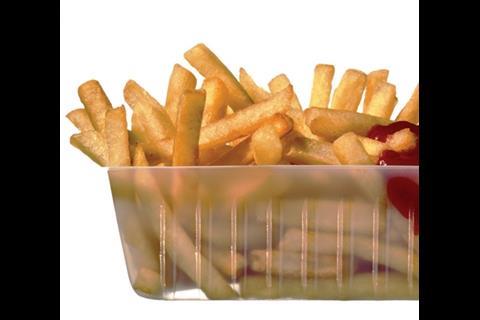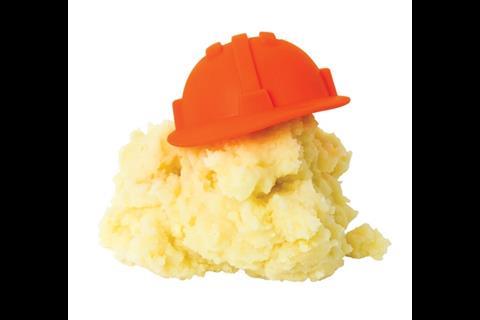As well as helping workers’ health, Taylor Woodrow has uncovered evidence that reducing carbohydrates may improve their safety. Building tucks in its napkin and investigates … and overleaf we launch our Nouvelle Canteen competition to find Britain’s best site food
When Taylor Woodrow’s site workers heard that the chip fryer had broken down and wouldn’t be back in action for a week, it was a blow. Chips were a canteen favourite and the ones on this site were particularly good. Little did they suspect that they were the guinea pigs in an informal experiment to see if changing the menu cut the number of accidents on site.
Carbohydrates like potatoes, bread and pasta used to be the everyday staples of the kitchen cupboard: cheap, filling and adaptable. But then Dr Atkins lurched onto the scene with his gut-busting diet of steak, butter and cheese and suddenly carbohydrates became the enemy. Carbs have been blamed for all sorts of things in recent years, from obesity to bloating to diabetes, so it was only a matter of time before they were accused of causing accidents on site, too.
The idea of cutting carbs on site to improve safety has been mooted by contractors and subbies up and down the country, although there has not yet been any serious medical research into what happens when you do. At Taylor Woodrow, the subject first surfaced at one of its regular safety forums, and managers decided to set up a low-key trial at the St Helens PFI hospital project on Merseyside.
Keeping the experiment quiet was of paramount importance – nobody takes kindly to being forced on to a diet, least of all builders, who tend to like their chips. Taywood feared that workers would complain, nip off to McDonald’s when they were needed on site or, worse, jump ship to other sites where fried foods were plentiful.
“If you start changing the menu without talking to the guys first they start complaining,” says Richard Miles, project director at St Helens. “So we said ‘the chip fryer’s broken down so we can’t do chips this week’. We had a few grumbles – they were good chips.”
We said ‘the chip fryer’s broken down so we can’t do chips this week’. We had a few grumbles – they were good chips …
richard miles, taylor woodrow
Other effects of the experiment were more difficult to gauge. There were three separate trials, lasting a week each. In January, carbs on the menu were cut by 50% and in the spring by 75%. In the summer, they were eliminated altogether. Taywood had an accident-free three months, but Miles is not convinced that it was down solely to the absent chip fryer – the trial weeks only accounted for a fraction of this time. Besides, he reckons Taywood is strict on safety, with a high degree of supervision. And at St Helens, a very large number of elements are made off site so there are fewer workers than usual.
Nor does he thinking going cold turkey on carbs is a good idea: “The guys do need a level of carbohydrate to function. It does make a difference if you are on site in the wind and rain.”
Carbs also came under suspicion at Coleman & Company, a demolition contractor in the Midlands. When it hired a local graduate to analyse precisely when accidents were occurring, a cluster was found around midday, an hour after morning breakfast. Could the humble bacon sarnie be to blame?
James Howard, Coleman’s strategic development manager, stresses that research is at a very early stage, but when the company’s new health and safety manager takes up post in the new year, they will be asked to look into it. “If you go out for a big meal at lunchtime, you feel a little bit tired in the afternoon,” he explains. “So if you’ve got guys having a traditional site breakfast of bacon, eggs, toast, fried bread – overdoing it on the carbs – perhaps it affects their concentration an hour later when it hits their system. It’s not particularly scientific; we’re just starting to ask questions like ‘what did you have for breakfast?’”
Medical research backs Howard up – but only in part. Immediately after a large meal, regardless of whether it is high in protein or carbohydrates, people become sleepy. Nutritionists say the so-called post-prandial effect is caused by the body having to work harder to digest large amounts of food. Claire Williamson, a nutrition scientist at the British Nutrition Foundation, recommends smaller, more regular meals on site.
There was little doubt what it was. Wedged in the roll, between my greasy, undercooked slice of bacon and a dollop of HP sauce, was a sticking plaster
“It’s really important that site workers eat regular meals to provide them with sustained energy,” she says. “Obviously on a site you’re restricted by canteen opening hours, but site workers shouldn’t eat massive portions as it increases tiredness in the short term.”
Williamson does not think carbs are the problem – she endorses their use for manual labourers. “Meals should include plenty of carbohydrate to provide energy, such as bread, rice, pasta, potatoes and cereals, and ideally some protein as well, such as lean meat, fish, eggs and pulses.”
In fact, Williamson’s advice will please hungry site workers: she allows frequent snacks and plenty of carbs. But she does recommend cutting fat: grilled meat only once or twice a week and lean cuts. Bread should be brown, breakfast should be porridge and when it comes to snacks, think cereal bars and fruit.
Cutting out chips is one thing, but whether site workers will start chowing down on lentils and beans remains to be seen.

How good is your grub?
Building is launching the Nouvelle Canteen competition to find the best site cafe in the industry. We’re looking for tasty, nutritious food and a welcoming atmosphere – nominated by workers and judged by experts. On the panel are journalist and canteen habitué Michael Glackin, nutritionist Claire Williamson and Time Out restaurant critic Guy Dimond. We know the standard of food on site is improving – now we want to taste it for ourselves.
So send us no more than 500 words on why your canteen is the best, with sample menus, plenty of photos and most importantly, worker testimonials. You can even send us a video and we’ll post it on the Building website. Building will compile a shortlist, and our judges will visit the best three in the new year. Submit your entries to canteencompetition@cmpi.biz by 31 December.
‘At least there wasn’t a finger in it, lad …’
Michael Glackin knows his site canteens. Here he recalls a particularly harrowing run-in with a bacon roll
We all examined the contents of my bacon roll. The sticky, strange-looking white thing could have been a bit of greaseproof paper. But it wasn’t. In fact, there was little doubt about what it was. Wedged in the roll, between my greasy, undercooked slice of bacon and a dollop of HP sauce, was a sticking plaster.
“At least there wasn’t a finger in it, lad,” counselled my colleague Pat. “You could damage your teeth on the nail of a finger.”
It’s a true story, and a funny one. But frankly, building site canteens, not to mention toilets and washing facilities, weren’t funny at all when I worked on sites in the early eighties.
Many of the women – there were few men – who ran the canteens had no formal training in catering, but worked very hard to keep their kitchens clean even if the menu didn’t vary much. However, many others didn’t, and with a captive clientele and ambivalent management (who never used the site canteen themselves), there was little incentive to improve things.
Apart from the often dirty, uncomfortable surroundings, canteen menus were dominated by fry-ups and processed foods. And yes, it was chips with everything. Breakfast was traditionally the busiest meal time, so the enthusiasm for fry-ups was perhaps understandable. But vegetables were almost unheard of except for potatoes and peas – and occasionally carrots – all poured out of large tins. This always surprised me since most of people I worked with enjoyed their fresh veg when we all went to a cafe after work.
Often the job of organising a canteen on smaller jobs or those winding down fell to one of the older labourers, who would find himself shifted from broom duties to catering. They generally produced decent grub, although it was usually restricted to bacon or sausage rolls and steaming mugs of tea.
That said, I recall an elderly labourer from Barbados who, after mastering the art of grilling bacon, expanded his menu by selling fishcakes and jerk chicken made by his wife. The memory of a dozen or so Irish carpenters happily tucking into reheated soul food for lunch, to the strains of Bob Marley gently rocking from the cassette player, has never left me.




























1 Readers' comment